In the game of building muscle, it’s not all about what you do in the gym. How you fuel your workouts is a crucial factor in how you gain muscle. Without adequate nutrition, all the leg presses and dumbbell rows in the world can’t prevent your gains from eventually coming to a screeching halt.
If you don’t fuel your workouts properly, you’re more likely to underperform, not grow, and be fatigued throughout your days. Starting your days off right with a solid bodybuilding breakfast can help you see the fruits of your labor take off.
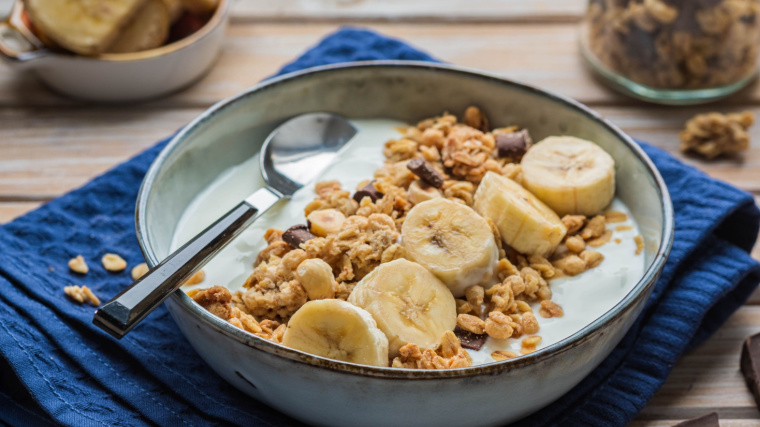
Even if you’re into intermittent fasting, everyone technically breaks their fast from sleep each day. Here’s how to start off your nutrition for the day with a bang so you can tackle and recover from your workouts with a full tank.
Editor’s Note: The content on BarBend is meant to be informative in nature, but it should not be taken as medical advice. When starting a new training regimen and/or diet, it is always a good idea to consult with a trusted medical professional. We are not a medical resource. The opinions and articles on this site are not intended for use as diagnosis, prevention, and/or treatment of health problems. They are not substitutes for consulting a qualified medical professional.
What Makes a Good Bodybuilding Breakfast?
Sure, everyone’s breakfast will look a bit different based on culture, preference, allergies, and specific physical and health goals. But the grand unifier of a typical bodybuilding breakfast is macronutrients — known in the gym world as macros. These are the three types of food that make up your daily caloric intake: namely, protein, carbohydrates, and fat.
- Proteins are made up of amino acids and they serve as the building blocks of muscle. They are primarily found in meat, dairy, and eggs, and in smaller amounts in grains, vegetables, and beans.
- Each gram of protein provides four calories of energy to your body.
- Carbohydrates are sugar molecules the body breaks down into glucose to supply you with energy. They are found primarily in grains, fruits, legumes, fruits, potatoes, and in smaller amounts in other vegetables.
- Each gram of carbohydrate provides four calories of energy.
- Fats also provide energy and support cell function by providing essential fatty acids to the body. Monounsaturated and polyunsaturated fats are found in olive oil, avocados, nuts, seeds, eggs, and fatty fish — your body can typically digest these relatively easily. Saturated fats are found in meats, cheese, eggs, and full-fat dairy products — these are tougher to digest.
- Each gram of fat provides nine calories of energy.
Bodybuilding Breakfast Foods
Stereotypically, bodybuilding breakfasts have contained some pretty bland foods, with few seasonings and little variety. In the 1990s through the 2000s, it was not uncommon to see bodybuilders in magazines eating flavorless breakfasts consisting of nothing but egg whites and oatmeal.
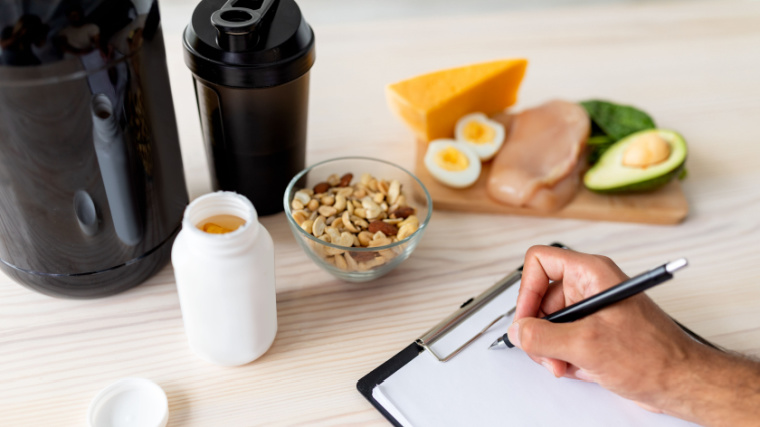
[Read More: Nutrition for Athletes — How to Eat for Muscle and Performance]
Rest assured: your diet does not have to be like this to be a bodybuilder. Here are some foods that you can include in your breakfast so that your diet is never bland, unvaried, or unenjoyable.
Protein
- Eggs (also contain fat found in yolks)
- Egg whites
- Ham
- Turkey bacon
- Bacon (also contains fat)
- Cheese (can be low-fat or full-fat depending on preference and macros needs)
- Steak (some cuts contain appreciable amounts of fat)
- Turkey
- Chicken
- Greek yogurt (also contains carbohydrates and fat)
- Cottage cheese (also contains fat and carbohydrates)
- Fish
Carbohydrates
- Fruit
- Oatmeal
- Cream of rice
- Cream of wheat
- Grits
- Rice
- Potatoes
- Wheat bread
- Vegetables (typically used in omelets and scrambles)
Fats
- Avocados
- Bacon (also contains protein)
- Cheese (also contains protein)
- Egg yolks (also contains protein)
Hitting Your Macros
As with hitting your macros with any meal, hitting them for breakfast requires knowledge of your daily caloric, protein, fat, and carbohydrate requirements. If you’re aiming to keep specific track of your macros, reading food labels and getting the nutritional contents of foods in databases like the FoodData Central feature on the United States Department of Agriculture (USDA) website or MyFitnessPal.
[Read More: Best Multivitamins]
For a personalized estimate of your ideal macros ratio, check out BarBend’s macros calculator.
Macronutrient Calculator
If you don’t want to keep track of your macros specifically but do want to ensure adequate protein intake for your goals, you can also make use of BarBend’s protein intake calculator.
Protein Intake Calculator
For simplicity’s sake, some bodybuilders prefer to spread their carbohydrates, protein, and fat allotments evenly over the number of meals they consume. You can spread your macros out over meals how you like, accounting for when you tend to work out and how your body reacts to specific foods.
Bodybuilding Breakfast Ideas
As a bodybuilder, you’ll cycle through different goals during various phases of competition prep. At any given time, you might be aiming to shed body fat, pack on as much mass as possible, or simply maintain your body weight and composition. Here are breakfast options for each of those phases.
- Bodybuilding Breakfast for Cutting
- Bodybuilding Breakfast for Maintenance
- Bodybuilding Breakfast for Bulking
Bodybuilding Breakfast for Cutting
If you’re in a cutting phase, it’s likely that you’re paying close attention to both daily caloric intake and your macros. Cutting for bodybuilding is the process of losing fat while maintaining muscle. This is accomplished with a program of lifting weights, performing cardiovascular activity, and following a diet with a caloric deficit.
To show how this is done, let’s use a 200-pound bodybuilder with 12 percent body fat who consumes five meals per day.
Macronutrient recommendations for cutting can range between 2.2 to three grams of protein, two to five grams of carbohydrates, and 0.5 to one gram of fat per kilogram of body weight per day. (1)
Note: As these are generalized ranges, individual bodybuilders must experiment with and adjust them to reach their current physical goal, whether it is cutting or otherwise. Consulting with a qualified nutritionist or registered dietician can help ensure that you’re dieting as psychologically and physically safely as possible.
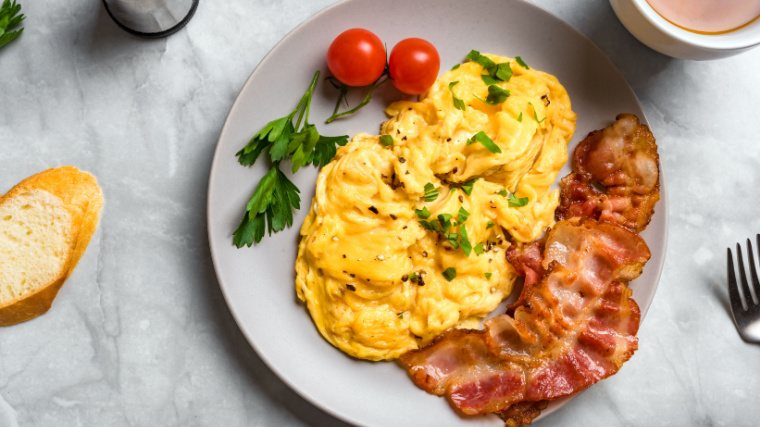
[Read More: 20 High-Protein, Low-Calorie Foods Worth Subbing Into Your Diet]
If our sample bodybuilder were to use the lower end of those recommendations, they would work out to 200 grams of protein, 182 grams of carbohydrates, and 80 grams of fat per day, providing 1,932 calories per day.
Divided over five meals, each meal will provide approximately 40 grams of protein, 36 grams of carbohydrates, and 16 grams of fat per meal.
This is just one example, but it can give you a ballpark of what your meals can be like. Keep in mind, to realistically construct meals, you do not have to hit macros exactly; they can be off by a few grams here or there.
Sample Breakfast for Cutting
Here, you’ll find a sample meal plan for a bodybuilder’s cutting breakfast. Adjust the portions as needed to suit your specific needs and macronutrient requirements.
[Read More: Best Vegan Protein Powders]
The nutritional information provided below comes from the USDA’s FoodData Central feature.
- 2 slices of turkey bacon (8 grams protein, 6 grams fat, 0 grams carbs)
- Vegetable omelet
- ¼ cup chopped bell peppers (0 grams protein, 0 grams fat, 1 grams carbs)
- ¼ cup onions (0 grams protein, 0 grams fat, 4 grams carbs)
- 1 whole egg (6 grams protein, 5 grams fat, 0 grams carbs)
- 1 cup egg whites (27 grams protein, 0 grams fat, 0 grams carbs)
- ½ cup oatmeal (5 grams protein, 3 grams fat, 27 grams carbs)
Total macros: 46 grams protein, 31 grams carbohydrates, 14 grams fat
Bodybuilding Breakfast for Maintenance
Maintenance phases in bodybuilding are periods in which bodybuilders manipulate their caloric and macronutrient intake and activity levels so that they experience no weight gain or loss.
It often requires some experimentation and adjustment to figure out one’s intake requirements for healthy weight maintenance. You might consider tracking your food intake and activities in a journal for a couple of weeks to see if they result in weight maintenance.
As with the macronutrient recommendations for cutting, there are generalized ranges of macronutrients recommended for maintenance. Of course, you’ll have to adjust them depending on your individual circumstances.
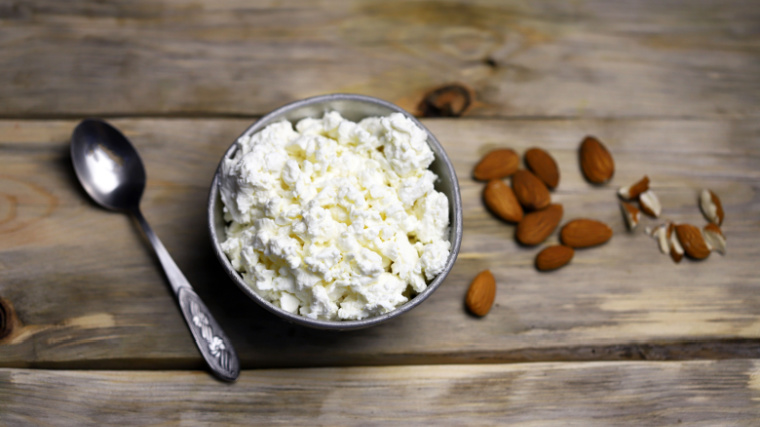
[Read More: The Best Healthy Fast Food Options at the Most Popular U.S. Chains]
These ranges are 1.8 to 2.7 grams of protein and two to five grams of carbohydrates per kilogram of body weight per day, with fat making up 15 to 35 percent of the total calories of the diet. (2)
Say our 200-pound bodybuilder requires 3,000 calories per day to maintain their weight. If we set their protein intake at two grams per kilogram and carbohydrate intake at four grams per kilogram, providing 181 (724 calories) and 363 grams (1,452 calories) respectively, their fat intake will come out to 91 grams (819 calories), or 27 percent of total calories.
Spread this out over five meals, and each meal will contain 36 grams of protein, 72 grams of carbohydrates, and 18 grams of fat.
Sample Breakfast for Maintenance
- 1 cup low-fat cottage cheese (26 grams protein, 2 grams fat, 12 grams carbohydrates)
- 28 almonds (6 grams protein, 17 grams fat, 8 grams carbs)
- ½ cup cream of rice (4 grams protein, 0 grams fat, 70 grams carbs)
Total macros: 32 grams protein, 19 grams fat, 82 grams carbs)
Bodybuilding Breakfast for Bulking
Bulking for bodybuilding refers to following a diet with a caloric surplus for gaining mostly muscular weight. As required for maintenance, some tinkering with food intake is necessary for moving toward this goal.
Say our 200-pound bodybuilder experimented with a 20 percent caloric increase to gain weight and used the upper end of recommended macronutrient ranges for protein and carbohydrates.
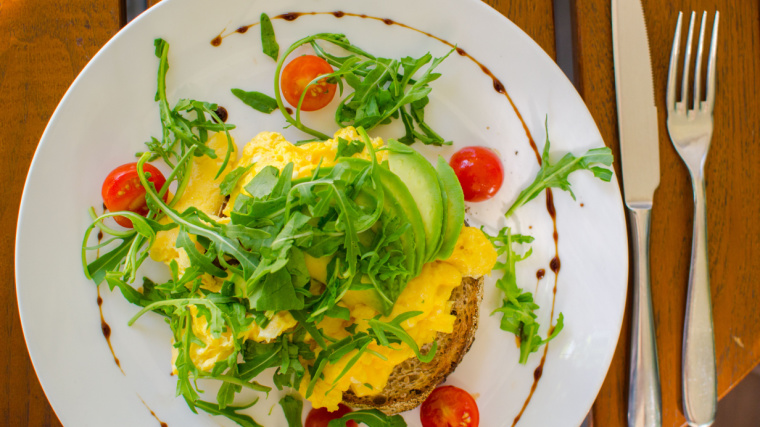
[Read More: How Much Protein Do You Actually Need Per Day?]
In this case, they would consume 245 grams of protein (981 calories), 455 grams of carbohydrates (1,818 calories), and 89 grams of fat (801 calories).
Spread out over five meals, each meal would provide 49 grams of protein, 91 grams of carbohydrates, and 18 grams of fat.
Sample Breakfast for Bulking
- Vegetable omelet
- 1 cup egg whites (27 grams protein, 0 grams fat, 0 grams carbs)
- ½ cup mushrooms (0 grams protein, 0 grams fat, 3 grams carbs)
- ½ cup onions (0 grams protein, 0 grams fat, 4 grams carbs)
- 1 slice fat-free cheese (8 grams of protein, 0 grams fat, 1 gram carb)
- 6 tablespoons (pre-cooked) Cream of Wheat (8 grams protein, 0 grams fat, 48 grams carbs)
- 3 slices wheat bread (4 grams protein, 1 grams fat, 30 grams carbs)
- ½ avocado (2 grams protein, 15 grams fat, 9 grams carbs)
Total macros: 49 grams protein, 16 grams fat, 91 grams carbs
What About Supplements?
Although supplements are not strictly necessary for all physique goals, they can provide a tremendous amount of variety, flavor, and convenience. For example, you can use a variety of flavored protein powders stirred into cottage cheese, yogurt, and oatmeal. You can also use them in a variety of recipes for muffins, pancakes, and healthy cakes.
For those who prefer convenience or do not have much time for food preparation in their mornings, you can make smoothies — including post-workout shakes — with protein powder, frozen fruit, nut butters, yogurt, or vegetables such as celery and spinach.
To ensure that you’re getting enough micronutrients (like vitamins and minerals) in your diet, a greens powder with breakfast can be very helpful.
[Read More: Best Pre-Workout Supplements]
If you prefer to start your days with a buzz for mental alertness from caffeine, you can opt for coffee, tea, or a caffeine-containing nutritional supplement.
The International Society of Sports Nutrition’s (ISSN) stance on caffeine is that it can be an effective aid for endurance and anaerobic performance and that doses of three to six milligrams per kilogram of body weight have been effective. (3)
Breakfast can also be a good time to take any supplements you use, such as creatine, BCAAs, or multivitamins so that you do not forget during your busy days.
Eat Up
You now have the knowledge to make breakfasts and other meals for all your physique needs and desires. With the best bodybuilding breakfast options in your kitchen, you’ll gain the energy to take on your toughest training days.
Tossing a little creativity and resourcefulness into the pan, you can make meals that are healthy and flavorful — and can be adapted to all your physique goals.
References
- Ruiz-Castellano et al. Achieving an Optimal Fat Loss Phase in Resistance-Trained Athletes: a Narrative Review. Nutrients. 2021 Sept; 13 (9): 3255.
- Iraki et. al. Nutrition Recommendations for Bodybuilders in the Off-season: A Narrative Review. Sports (Basel). 2019 July; 7(7): 154.
- Guest NS et al. International Society of sports nutrition stand: caffeine and exercise performance. J Int Sports Nutr. 2021 Jan 2; 18(1):1.
Featured Image: Happy_food_photo / Shutterstock